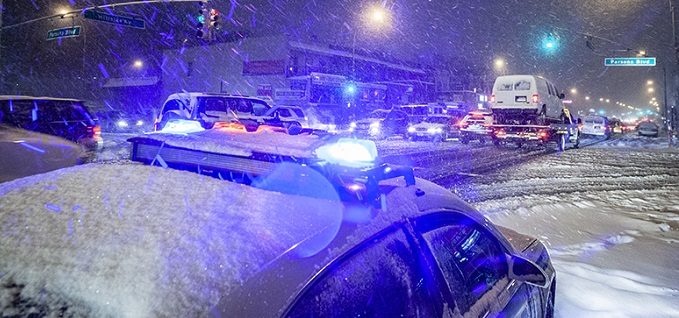Weather-related training for first responders
November 14, 2018
An Illinois college is expanding training for police and first responders to make communities safer.
First responders are the first line of defense in any emergency. Their ability to respond to and recover from emergencies is directly influenced by their preparedness level.
Now a pair of College of DuPage (COD) professors wants to expand that preparedness to include more training on weather-related emergencies.
“The number one thing police officers deal with almost consistently is weather-related emergencies,” said meteorology professor Paul Sirvatka. “Weather safety and weather response is a huge part of what they do, and I don’t think they know as much about it as they should.”
Sirvatka speaks from experience. As a leading expert in the field, he has taught many communities how to build weather-preparedness plans. And for more than 25 years, Sirvatka has developed the Illinois college’s meteorology program into one of the leading programs in the country.
“I’ve had a lot of experience with situations where emergency plans are weak and there are accidents waiting to happen,” he said. “Police departments generally consider themselves as responders rather than pre-disaster players. The more that we train police and first responders in weather, the safer our communities.”
Filling a void
Seeing this problematic oversight in several communities, Sirvatka wanted to make sure that students in COD’s criminal justice program had the correct tools and techniques to respond to severe weather when they are on the front line. He set up a meeting with criminal justice professor Theo Darden to see if they could work together on an interdisciplinary curriculum.
Darden, a 17-year police veteran, said that one of the glaring omissions in criminal justice-related textbooks is understanding what law enforcement’s role is in inclement weather.
“In the United States, you are more likely to be injured or even killed by inclement weather than by someone stabbing you, for example,” Darden said. “It’s a very important topic and one, to tell you the truth, that doesn’t come up very much in the discussions or in the current curriculum.”
Darden is beginning to work with other criminal justice faculty members to update the planning and advising worksheet to ensure that new students to the program are aware of the hazardous weather preparedness class offered by Sirvatka.
“As faculty, we need to talk to our students about choosing electives that would more align with what they would want to do professionally,” he said. “Criminal justice students need a science requirement, so instead of leading them blind to pick one, we need to be guiding them to what will benefit them in the future. A weather class counts as a science requirement, but many students don’t connect those dots.”
Sirvatka and the criminal justice faculty’s next step is to review the COD’s homeland security program certificate class requirements to see if they can potentially incorporate a weather class into the curriculum.
“In most 14-week training academies, weather is only minimally touched upon,” Darden said. “They expect you to be trained on that when you are in your field training, but you need to be prepared before that takes place. In my 17 years, I can only think of a handful of times I learned about weather at an agency. Preparing our students ahead of time is setting them up for success.”
There’s more to the story! Read the full article in CC Daily.


